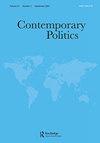Party polarisation in the American Congress and the duration of legislated economic sanctions, 1945–2005
IF 2
3区 社会学
Q1 POLITICAL SCIENCE
引用次数: 0
Abstract
ABSTRACT This article explores whether party polarisation in the American Congress affects the length of legislated sanctions. While Congress can enact sanctions, it usually authorises the president to waive, suspend or terminate them. However, Congress can prevent the president from ending a sanction if both parties can cooperate to block the presidential proposal or pass a sanction bill challenging the presidential preference. Borrowing from moderate polarisation argument that both parties can cooperate only when they are moderately polarised, I argue that the probability of sanction termination declines if Congress is moderately polarised but increases when Congress is either least or extremely polarised. This is because only under moderately polarised Congress can both parties cooperate to stop the sanction termination. I test this argument using TIES data (1945–2005) and find support for this expectation. This research contributes to our knowledge on the role of congressional dynamics in shaping American foreign policy.1945年至2005年美国国会中的党派两极分化和法定经济制裁的持续时间
摘要本文探讨了美国国会中的党派两极分化是否会影响立法制裁的期限。虽然国会可以制定制裁措施,但通常授权总统放弃、暂停或终止制裁。然而,如果两党能够合作阻止总统提案或通过一项挑战总统偏好的制裁法案,国会可以阻止总统终止制裁。借用温和两极分化的论点,即两党只有在适度两极分化的情况下才能合作,我认为,如果国会适度两极分化,终止制裁的可能性会下降,但当国会两极分化程度最低或极为严重时,制裁终止的可能性会增加。这是因为只有在适度两极分化的国会下,两党才能合作阻止制裁的终止。我使用TIES数据(1945–2005)测试了这一论点,并找到了对这一预期的支持。这项研究有助于我们了解国会动态在塑造美国外交政策中的作用。
本文章由计算机程序翻译,如有差异,请以英文原文为准。
求助全文
约1分钟内获得全文
求助全文

 求助内容:
求助内容: 应助结果提醒方式:
应助结果提醒方式:


